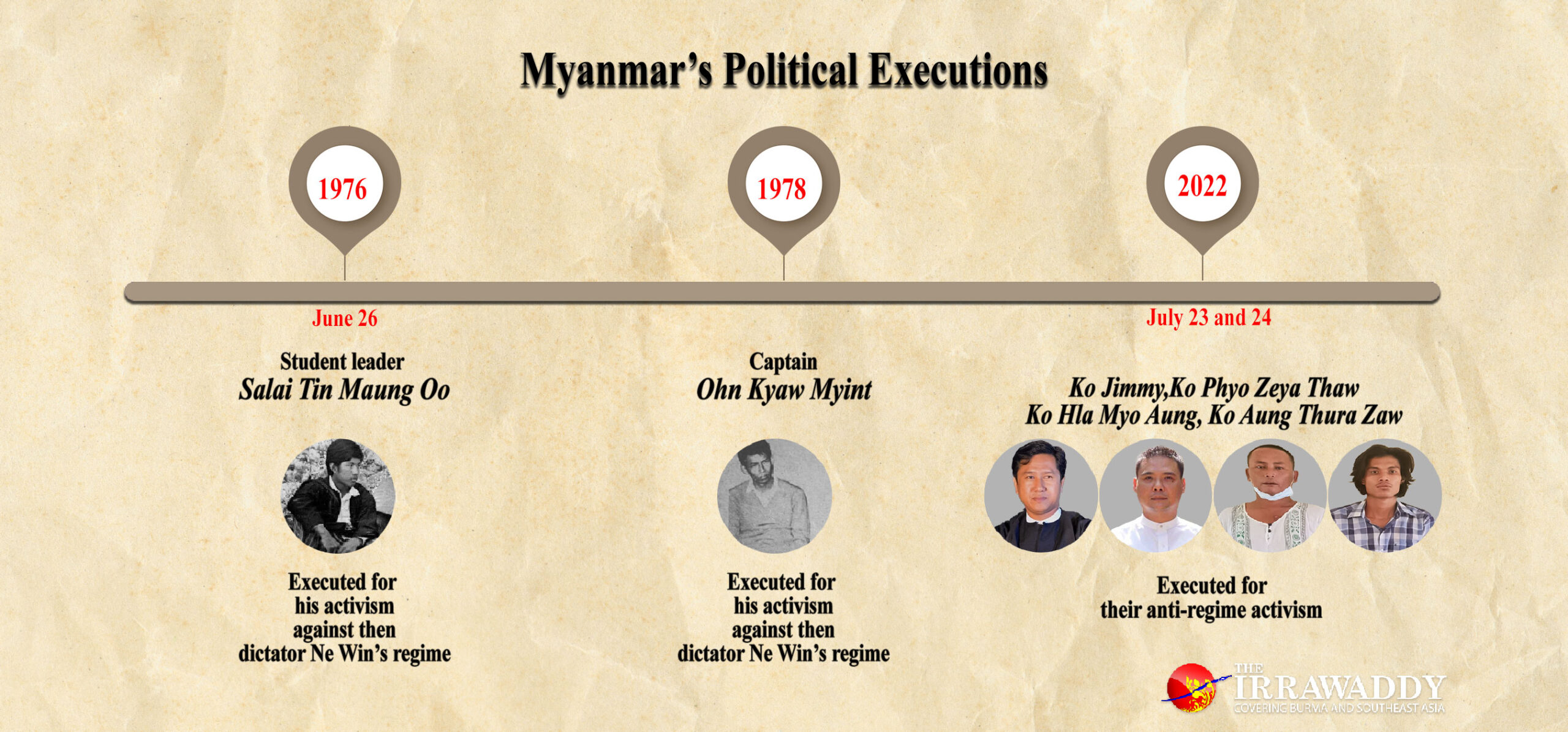The hangings of ‘88 Generation student leader and pro-democracy veteran Ko Jimmy, former National League for Democracy lawmaker Ko Phyo Zeya Thaw, Ko Hla Myo Aung and Ko Aung Thura Zaw have marked another horrendous entry in the grim history of executions in Myanmar.
Last Friday, July 22, Ko Jimmy and Ko Phyo Zeya Thaw were allowed to speak to their relatives for the first time since their arrest via video conferencing at Yangon’s Insein Prison. They didn’t know that it was to be their last meeting with their families.
Their relatives were not told about the planned executions, even though prison authorities had promised that they would be alerted before the men were taken to the gallows.
They were hanged over the weekend, the first executions in Myanmar in over three decades. Their family members learned about the executions only after junta-controlled media reported the news on Monday.
When their relatives asked the prison authorities for confirmation that the death sentences had been carried out, they were disrespectfully told to check the newspapers. When they asked if they could collect their corpses or ashes, they were told that there is no such tradition or law. The family members were also not informed exactly when the men were executed.
The prison manual allows relatives to visit prisoners on death row before their execution and to ask for the return of their bodies. The manual says that only if relatives or friends of the executed prisoner do not ask for the corpse, should prison authorities carry out the funeral. But in the case of Ko Jimmy, Ko Phyo Zeya Thaw and the other two men, the family members were not allowed to retrieve their bodies, a decision made by the junta and passed onto the prison authorities.
In modern Myanmar history, only two political prisoners had been hanged by previous regime until the executions of Ko Jimmy and the others. They were army captain Ohn Kyaw Myint and student leader Salai Tin Maung Oo.

The hanging of ethnic Chin student leader Salai Tin Maung Oo, along with executions of Ko Jimmy, Ko Phyo Zeya Thaw, Ko Hla Myo Aung and Ko Aung Thura Zaw, occurred under military rule and can be described as both extrajudicial killings and grave human rights violations.
Salai Tin Maung Oo was hanged on June 26, 1976 at the age of 25 for his opposition to the rule of General Ne Win. His body was not returned to his family. The then military regime also detained his parents and three siblings along with him in Insein Prison, so he was at least able to see them.
His parents were allowed to meet him the day before his execution, but they were not told by the prison authorities about the impending execution. Immediately after their final meeting, his parents were moved to other prisons. Salai Tin Maung Oo’s body was cremated immediately after he was hanged.
Captain Ohn Kyaw Myint was hanged in 1978 for his part in a plot to topple General Ne Win’s regime. He was executed without his family’s knowledge. Nor was his wife, who had regularly visited him in Insein, informed that the execution was going ahead, according to Daw Aung San Suu Kyi’s aide U Win Htein, who was then an army captain and had also been charged for withholding information about the plot.
However, prison authorities said the family was alerted about the captain’s execution, and his body was handed over to the wife and a funeral arranged at Yangon’s Kyan Taw Cemetery.
In the history of executions in Myanmar, dictators have never shown any sympathy towards the bereaved families.
But current coup leader Senior General Min Aung Hlaing has set a new, infamous low for treating the families of the executed with disdain. Far from returning the bodies, he didn’t even tell the relatives the exact date of the executions, which made it difficult for the families to perform the Buddhist funeral rites.
It is a traditional custom for Buddhists to offer meals and other offerings to monks on the seventh day after the death of a relative.
Min Aung Hlaing’s cruelty has drawn condemnation around the world.
“These reprehensible acts of violence further exemplify the regime’s complete disregard for human rights and the rule of law,” said United States Secretary of State Antony Blinken in a statement about the executions.
“The regime’s sham trials and these executions are blatant attempts to extinguish democracy; these actions will never suppress the spirit of the brave people of Myanmar,” he added.

















